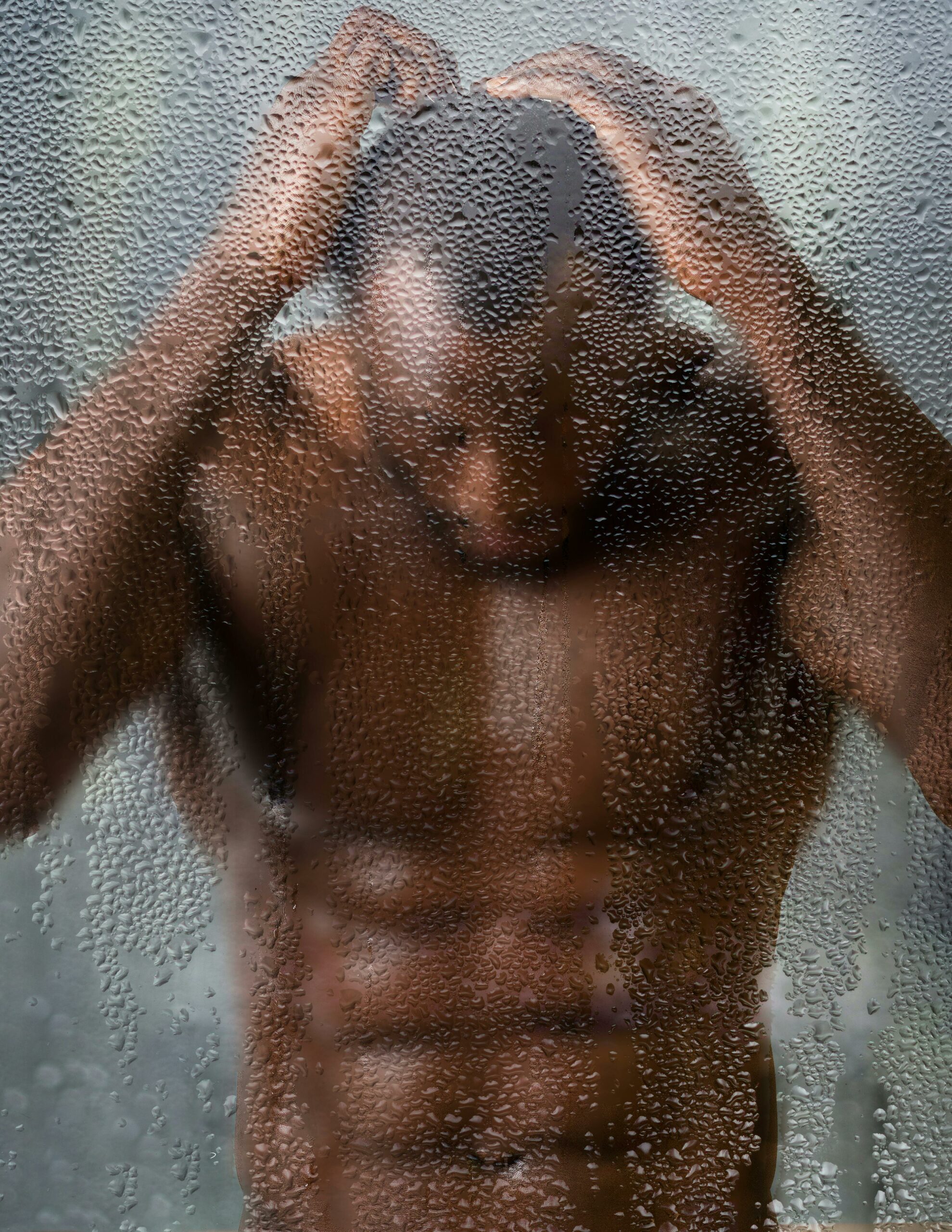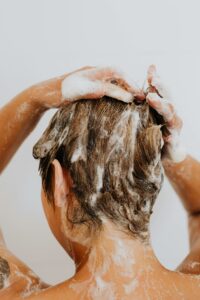The Secrets Of Sebum Production Revealed

Whenever I read a Harry Potter book and reach a description of Professor Severus Snape’s curtains of greasy hair, I think to myself: you know, he probably should have taken care of that.

Trust me, greasy hair isn’t fun.
And it’s true. Oily hair and greasy scalps are a real pain. I know this because I used to have relatively greasy hair. It changed a tad with the weather, but overall it remained greasy. The shampoos which I used (over-the-counter mostly, but medically-prescribed ones as well) were not my cup of tea. They were filled with chemicals and God knows what. I care a lot about what goes into my hair and subsequently by body.
But, let’s back up a minute. What makes a scalp and hair oily, anyway?
What Is Sebum Oil?
There is a substance that is naturally secreted by glands located all over our body. Those glands are called sebaceous glands, and what they produce is a waxy, oily secretion called sebum. Sebum is our body’s natural oil. It protects the skin from unwanted intruders (bacteria, fungus) and helps regulate the intake of water through the skin. It also helps to keep our skin moisturized and hydrated. This ultimately prevents our skin from drying out and becoming flaky and irritable. Research done on human sebum and its components revealed that sebum is made up of triglycerides and fatty acids, cholesterol, squalene, and wax esters.
Generally, sebum production is affected by hormones in our body known as androgen’s (sex hormones). Testosterone is thought to increase sebum production, while estrogen helps to decrease sebum production. Sebum is a wonderful thing. However, like everything else is life, there is such an idea as having too much of a good thing.
Too Much of A Good Thing Is… A Bad Thing
Having too much oil in your hair and scalp can cause greasiness, itchiness, and general discomfort. It can also escalate to more severe skin conditions. Having too much sebum on your face is also not recommended, as it can lead to outbreaks of acne and other kinds of pimples. Having too little sebum causes an opposite effect. The skin or scalp gets dry and red, the hairs become brittle and malnourished, and dandruff is everywhere.
Sebum is a unique substance. Its waxy, oily composition actually aids in the production of ear wax. Sebum changes with age, sex, hormonal issues, diet, and other factors. For instance, during puberty, hormones cause the levels of sebum to spiral out of control, which leads to spots and pimples of all kinds. Women who are pregnant, menstruating, nursing, or going through menopause are likely to see drastic changes in sebum production and secretion.
Why Is My Skin Producing So Much Sebum?
Are you struggling with an over-oily complexion and want to know why that may be? You should probably continue reading because these are the most likely causes of the issue.
Firstly, you’re probably dehydrated. It may sound strange that having less moisture leads to an oily complexion. But when your body is running low on hydration, it works to produce its own in the form of sebum oil. This usually appears on your face, but it can affect the oil levels of your entire body. So it’s important to stay well hydrated over the course of the day- 1.5 liters, to be exact.
The next few reasons are all directly linked to your beauty and hygiene routines, so it’s imperative that you pay attention to ensure that you follow the correct procedures when it comes to keeping clean. Firstly, over-exfoliating is one of the leading causes of excessive oil. While our skin may feel smooth and oil-free after a good exfoliation session, doing so too often causes our skin to produce more oil to try and balance out the loss. In doing so, we create more oil than there was before over-exfoliating. I would say to keep your exfoliation sessions down to about twice a week at most to ensure that you give your skin time to balance itself out. Secondly, if you’re using products that are not suited to your skin type or are too harsh (chemical ingredients), you can strip away the sebum oil on your skin’s surface. This will lead to similar results, as your body will produce more oil to help balance out the loss. It’s also imperative that you use a good natural moisturizer after your exfoliation session to ensure that your skin is hydrated and balanced. This will help to prevent the formation of excess sebum oil, as your skin will already be balanced.
If you’re experiencing acne due to excessive sebum production, your doctor might recommend using isotretinoin. According to a 2009 study, isotretinoin remains the most effective treatment for severe acne. Either way, check with your healthcare provider before going ahead.

Take caution not to use too much powder on oily skin types!
Finally, if you’re someone who tends to use a lot of powder on your skin, you could be worsening the oil issue rather than controlling it. Powder works to literally suck the moisture out of your skin, and yet again, this will cause your skin to produce more oil as a means of balancing itself out. Once the oil gets trapped under a layer of powder, it wreaks havoc on your pores and complexion by forming a cakey coating that leads to inflamed pores and causes acne. So if you suffer from oily skin, try to avoid using powders so often to help keep your skin balanced.
Try using #hempseedoil on #oilyskin as it doesn’t clog your #pores #naturalremedies #naturalskincare #comedogenic #acne #skincaretips pic.twitter.com/6qs21f8dvz
— Bee Green Magazine (@beegreenmag) October 16, 2017
Why Is My Skin Producing So Little Sebum Oil?
Yet again, one of the most common reasons for having dry skin is due to the fact that you are most likely dehydrated. While oily-skin types generally produce more oil when the body is lacking moisture, normal to drier skin types simply dry up. So be sure to monitor you daily water intake – I recommend filling a 1.5-liter bottle in the morning and making sure that it’s finished by the time you go home.
Dry skin can also be directly related to your diet. So it’s important that you pay close attention to the type of foods that you eat if you’re trying to stop your skin from drying out. A high-calorie diet has been shown to decrease the skin’s natural sebum secretion rate. Therefore, it’s important to avoid these and rather focus on getting more carbohydrates in your meals. Carbohydrates have been shown to increase sebum production, and eating whole grain foods like brown rice, brown pasta, and pulses are a great way to stimulate your skin’s natural sebum production.
You will also need to increase your omega-3 and omega-6 fatty acids intake as well as your linoleic acid intake, as these are crucial to affecting your skin’s natural oil production. To do this, be sure to eat lots of cold-water fish such as sardines and mackerel, as well as flax and chia seeds. You can also use the cold-processed oils of these seeds as well as omega supplements to help balance out your body’s natural oil levels and ultimately allow your skin to moisturize itself as need be.
Be sure to keep moisturizing your skin regularly throughout the day as well and using very mild facial cleansing products. Ideally, stay clear of chemical-based or alcohol-based toners and facial scrubs or cleansers, as these can strip the sebum oil from your face and will cause your skin to dry out quicker than usual.
How To Treat Your Skin To Regulate Sebum Oil
Too Much Sebum Oil
If you’re suffering from an over-oily skin type, it’s well worth the while to ensure that you’re drinking enough water since staying hydrated is key to maintaining a well-balanced skin type. It will also help to flush out toxins from your body, which means that you’ll have a clearer complexion overall.

Be sure to drink plenty of water.
I would also recommend cutting out any chemical and alcohol-based cleansing products from your daily beauty routine. They tend to strip the oil from the surface of your skin, which in turn causes your skin to produce more oil as a means of countering this effect.
I would suggest using lavender oil as a natural toner. You can blend almond oil, honey, and a pinch of sugar and water together to make a gentle, natural, and effective exfoliator. This will help you to control the excess sebum oil on your skin whilst actively preventing the spread of bacteria that leads to inflammation and ultimately the formation of pimples/acne. It’s also imperative that you avoid using thick foundations or too much powder on your skin, as this will cause your skin to become cakey. It also helps to trap bacteria in your pores, worsening the signs of inflammation and acne.
Treating oily skin is a lot easier than many would have us believe – and it can be done a whole lot cheaper than most would ever realize. It’s really just a process of being aware: aware of how much water you consume, aware of the products that you use and aware of how harmful too much makeup can be for your skin.
Too Little Sebum Oil

You should only exfoliate once or twice a week.
If your skin is feeling dry, itchy or irritable, you’re most likely running low on sebum oil- which means you’re also probably running low on water. If you have a normal to dry skin type, unlike oilier skin types, when you’re running low on moisture your skin will simply dry up. So be sure to get your recommended daily dose of water (1.5-2 liters). It will make a big difference in terms of your complexion, and it will relieve dry skin.
Is it “Derma Roller” or “DermaRoller?” Find out in our Benefits of Dermarolling feature!
It’s also very important that you cut alcohol-based cleansers and toners out of your beauty routine. This is because alcohol (and fragrances) tend to dry out your skin by stripping the sebum oil from its surface. They can also cause your skin to become itchy and irritable so it’s best to stick to natural alternatives instead, as they’re better suited to sensitive skin types.
I’d recommend using lavender or tea tree oil as a natural toner. Use a facial scrub that is as free of chemicals like parabens as possible. Ideally, a DIY recipe would work best, such as blending tea tree oil with a little honey and sugar to create a potent antibacterial, natural exfoliator. However, even when using a natural alternative, it’s better to only exfoliate a maximum of twice a week in order to give your skin time to balance itself out.
It’s also important that you monitor your diet. Try to cut out as many calories as possible and stick to a whole grain, whole and raw food carb-based diet instead. Include lots of olive oil in your diet, eat cold-water fish like mackerel and sardines often to up your omega-3 and omega-6 intake, and eat as many avocados, almonds, walnuts, broccoli, sweet potatoes, apricots and carrots as possible. These are rich in carotenoids, which help to increase cell growth and stimulate sebum oil production. They also give you a more balanced and well-rounded complexion in general.
Conclusion
People aren’t all the same, but we can all use help when it comes to our natural oils. We only need to pick out the shampoos that are right for us and see how they affect our skin. Some people need hydrating and moisturizing products, while others may be seeking ways to get rid of sebum in excess. Sebum is affected by so many outside and inside sources, which means it can be very difficult to find a shampoo that truly works. The best advice is to switch to a more natural degrease shampoo.
Chemicals and other ingredients may block your pores and hair follicles, causing the sebum to build up. Although sebum is odorless, when you have too much on you, bacteria breaks it down. This can lead to unpleasant odors and unnecessary grief. Take care of yourself and your skin. It is our biggest organ, and it covers our entire body. It helps make up the greatest tool we will ever own.

